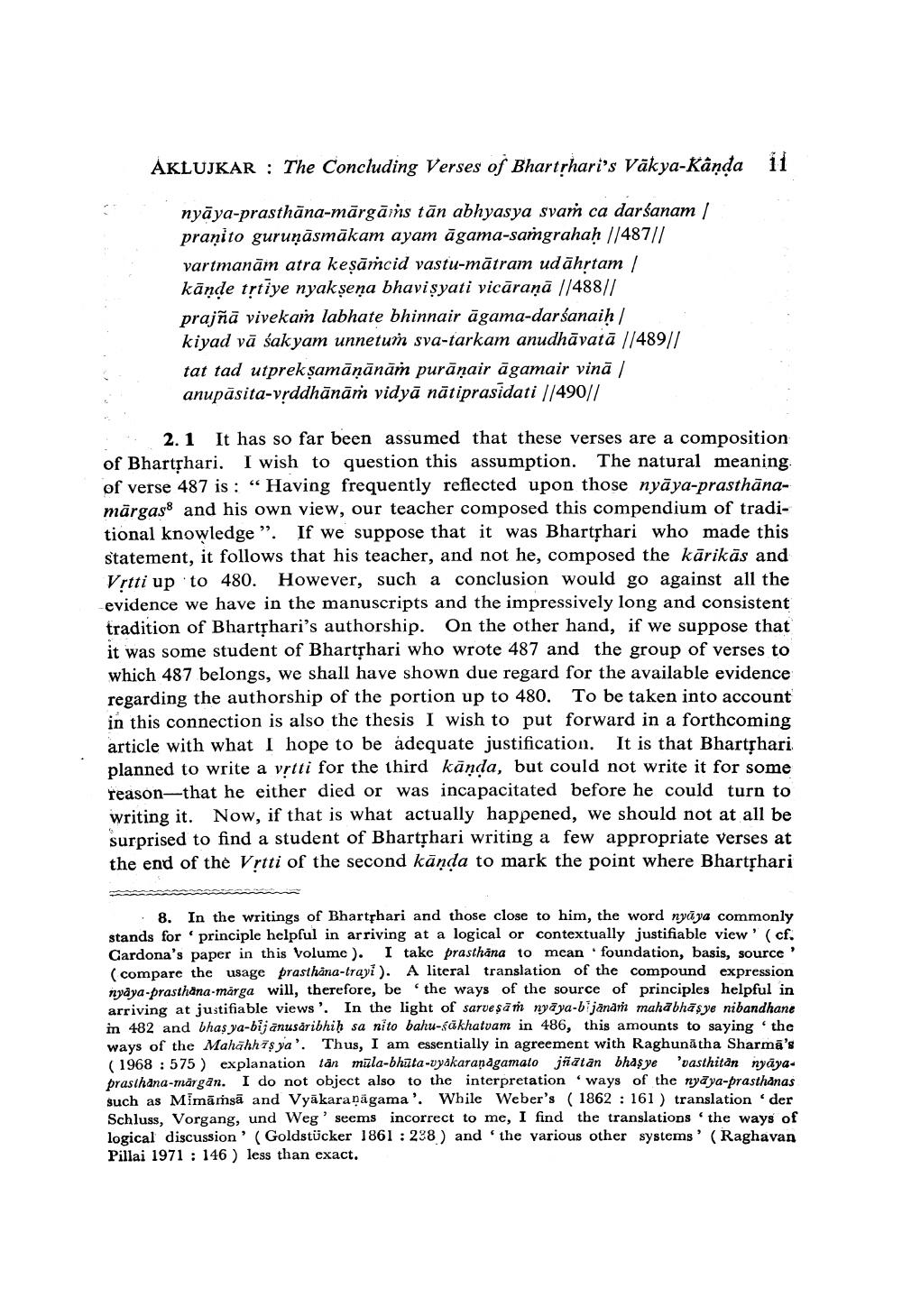Book Title: Concluding Verses Of Bhartrharis Vakya Kanda Author(s): Ashok Aklujkar Publisher: Ashok Aklujkar View full book textPage 3
________________ AKLUJKAR : The Concluding Verses of Bhartṛhari's Vākya-Kāṇḍa ii nyāya-prasthāna-margāms tān abhyasya svam ca darśanam [ pranito guruṇāsmākam ayam agama-samgrahaḥ //487// vartmanām atra keṣāṁcid vastu-matram udahṛtam | kände tṛtiye nyakṣena bhaviṣyati vicāraṇā ||488// prajñā vivekam labhate bhinnair āgama-darśanaiḥ kiyad vā sakyam unnetum sva-tarkam anudhāvatā ||489|| tat tad utprek ṣamāṇānām purāṇair āgamair vină anupasita-vṛddhānāṁ vidyā nätiprasidati //490// 2.1 It has so far been assumed that these verses are a composition of Bhartṛhari. I wish to question this assumption. The natural meaning of verse 487 is: "Having frequently reflected upon those nyāya-prasthanamärgas and his own view, our teacher composed this compendium of traditional knowledge". If we suppose that it was Bhartṛhari who made this statement, it follows that his teacher, and not he, composed the kärikäs and Vṛtti up to 480. However, such a conclusion would go against all the evidence we have in the manuscripts and the impressively long and consistent tradition of Bhartṛhari's authorship. On the other hand, if we suppose that it was some student of Bhartṛhari who wrote 487 and the group of verses to which 487 belongs, we shall have shown due regard for the available evidence regarding the authorship of the portion up to 480. To be taken into account in this connection is also the thesis I wish to put forward in a forthcoming article with what I hope to be adequate justification. It is that Bhartṛhari planned to write a vṛtti for the third kända, but could not write it for some reason that he either died or was incapacitated before he could turn to writing it. Now, if that is what actually happened, we should not at all be surprised to find a student of Bhartṛhari writing a few appropriate verses at the end of the Vṛtti of the second kända to mark the point where Bhartṛhari 8. In the writings of Bhartṛhari and those close to him, the word nyaya commonly stands for principle helpful in arriving at a logical or contextually justifiable view' (cf. Cardona's paper in this volume). I take prasthana to mean foundation, basis, source ' (compare the usage prasthana-trayi). A literal translation of the compound expression nyaya-prasthana-marga will, therefore, be the ways of the source of principles helpful in arriving at justifiable views'. In the light of sarveṣam nyaya-bijanaṁ mahabhaṣye nibandhane in 482 and bhasya-bijānusāribhiḥ sa nito bahu-sakhatvam in 486, this amounts to saying the ways of the Mahahhiṣya'. Thus, I am essentially in agreement with Raghunatha Sharma's (1968: 575) explanation tan mula-bhūta-vyakaranagamato jñatan bhasye 'vasthitan nyaya prasthana-margan. I do not object also to the interpretation ways of the nyaya-prasthānas such as Mimāṁsā and Vyakaraṇāgama'. While Weber's (1862 161) translation der Schluss, Vorgang, und Weg' seems incorrect to me, I find the translations the ways of logical discussion' (Goldstücker 1861:238) and the various other systems' (Raghavan Pillai 1971 146) less than exact.Page Navigation
1 2 3 4 5 6 7 8 9 10 11 12 13 14 15 16 17 18
